WORLD NEWS

Asian and Pacific Rim leaders have pledged their support for trade and investment that “benefits all”, concluding the Asia-Pacific Economic Cooperation (APEC) summit on a note of optimism after the United States and China agreed to cool their years-long trade rivalry.
The APEC leaders’ declaration on Saturday followed a high-stakes meeting between US President Donald Trump and Chinese President Xi Jinping, where both sides agreed to “lower the temperature” in their economic confrontation. The meeting — their first since 2019 — marked a potential turning point in one of the world’s most consequential rivalries.
Trump departed South Korea after talks with Xi, leaving the Chinese president to take centre stage at the two-day summit hosted by South Korean President Lee Jae Myung.
In their joint declaration, the 21 APEC member nations — including the US, China, Japan, and South Korea — reaffirmed their commitment to “deepening economic cooperation” and advancing regional integration that is “market-driven and inclusive.”
Leaders also pledged to strengthen collaboration on artificial intelligence, tackle demographic challenges such as declining birth rates, and promote capacity building and business engagement across the Asia-Pacific region.
Xi, in his address at the summit’s opening, positioned China as a defender of multilateralism and free trade, urging countries to unite in navigating an “increasingly complex and volatile” global environment.
South Korean President Lee echoed those sentiments, warning that the global trading system faces strong turbulence.
“The free trade system is experiencing strong turbulence, global economic uncertainty is deepening, and momentum for trade and investment is weakening,” Lee said.
Despite the display of unity, the leaders’ statement notably avoided direct references to the World Trade Organization (WTO) or “multilateralism”, reflecting persistent divisions and rising populist sentiment worldwide.
Trade analyst Deborah Elms of the Hinrich Foundation remarked that it was “probably a miracle” the leaders managed to reach an agreement at all, noting that the statement “hung in the balance until the last minute” due to conflicting national positions.
Beyond the trade agenda, Xi and Lee held their first bilateral summit since Lee’s election earlier this year. Both leaders emphasized the importance of regional stability and agreed to enhance communication over the North Korea issue.
Xi described China and South Korea as “inseparable cooperation partners,” while Lee called for a “horizontal and mutually beneficial relationship” between the two nations.
Lee’s administration has sought a more balanced approach between Washington and Beijing, as Seoul continues to rely on the US for security and China as its top trading partner. In 2024, South Korea exported nearly $133 billion worth of goods to China and $127.8 billion to the United States.
Regional expert Rob York noted that Lee’s diplomatic strategy aims to maintain stability with both powers while discreetly addressing security and technology concerns.
“There isn’t much to be gained right now in having those issues erupt in public,” York said.
The 2025 APEC summit concluded with a cautiously optimistic tone, underscoring both the opportunities and challenges facing the Asia-Pacific as it navigates shifting geopolitical and economic dynamics.




